University MBA600 Capstone Reflective Essay: Skills & Learning
VerifiedAdded on 2022/10/12
|15
|3513
|306
Essay
AI Summary
This reflective essay analyzes the MBA Capstone course, focusing on the development of skills and their practical application. The essay begins with an introduction and a summary of reflective capabilities, including the 'knowing, doing, and being' framework, and the four essential capstone skills: theoretical, applied, practical, and reflective. The student reflects on the learnings from the capstone subject and the consultancy research process, detailing the development of strategic thinking, practical, and reflective skills, as well as the ability to lead teams. The essay also examines the application of these skills in future career endeavors, reflecting on how the MBA program has contributed to the student's growth. The student discusses the importance of applying theoretical knowledge to solve real-world problems, emphasizing the development of a strategic mindset through reframing, systems thinking, and reflection. The essay also reflects on the student's initial apprehensions about the MBA program and the paradigm shift in their understanding of management education, highlighting key workshops on leadership, change management, and ethics, and the activities that reinforced the connection between theory and practice. The student reflects on the skills gained, highlighting how they have been used in various situations, and how they will assist in future career endeavors, providing a comprehensive overview of the MBA Capstone experience and its impact on the student's professional development.
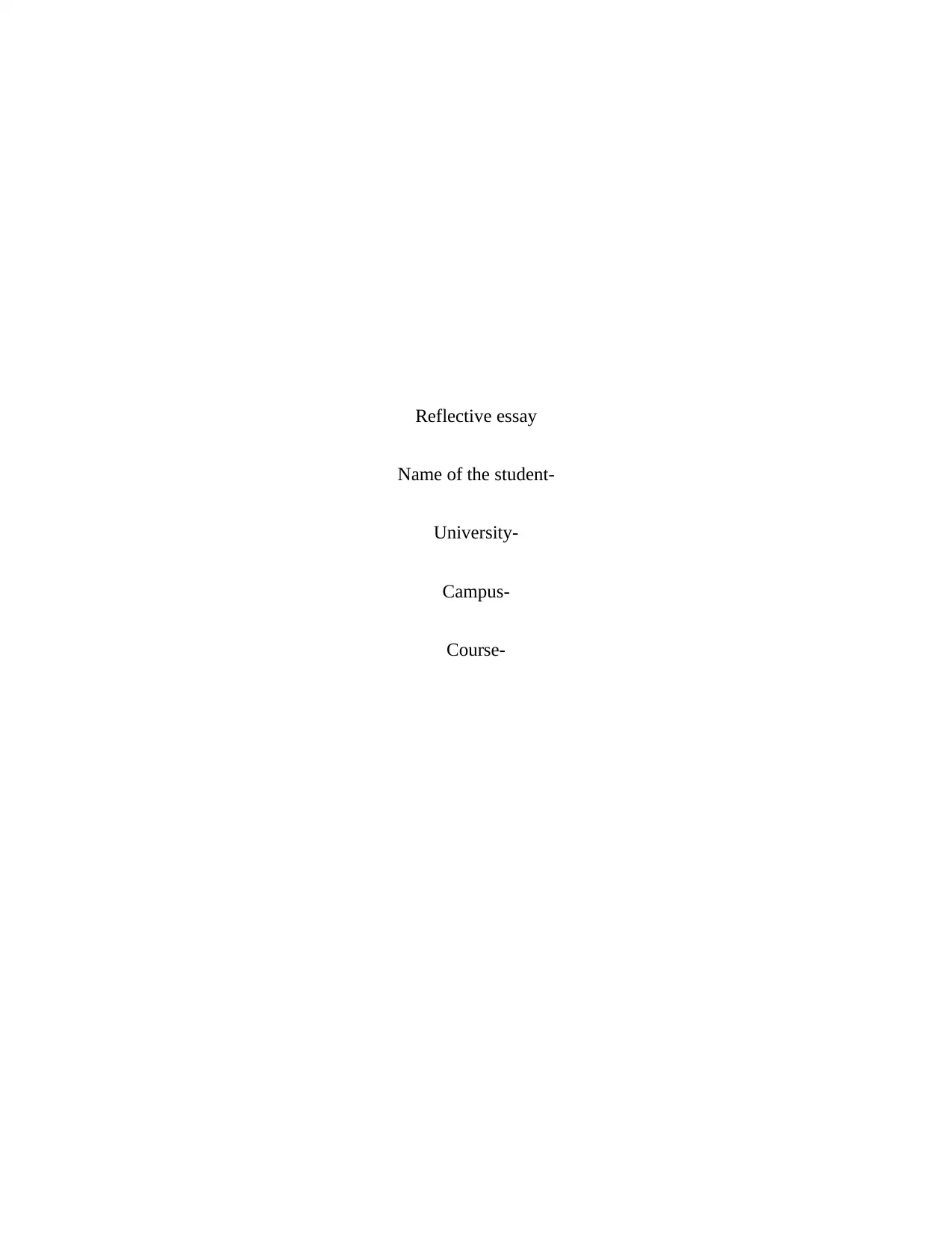
Reflective essay
Name of the student-
University-
Campus-
Course-
Name of the student-
University-
Campus-
Course-
Paraphrase This Document
Need a fresh take? Get an instant paraphrase of this document with our AI Paraphraser
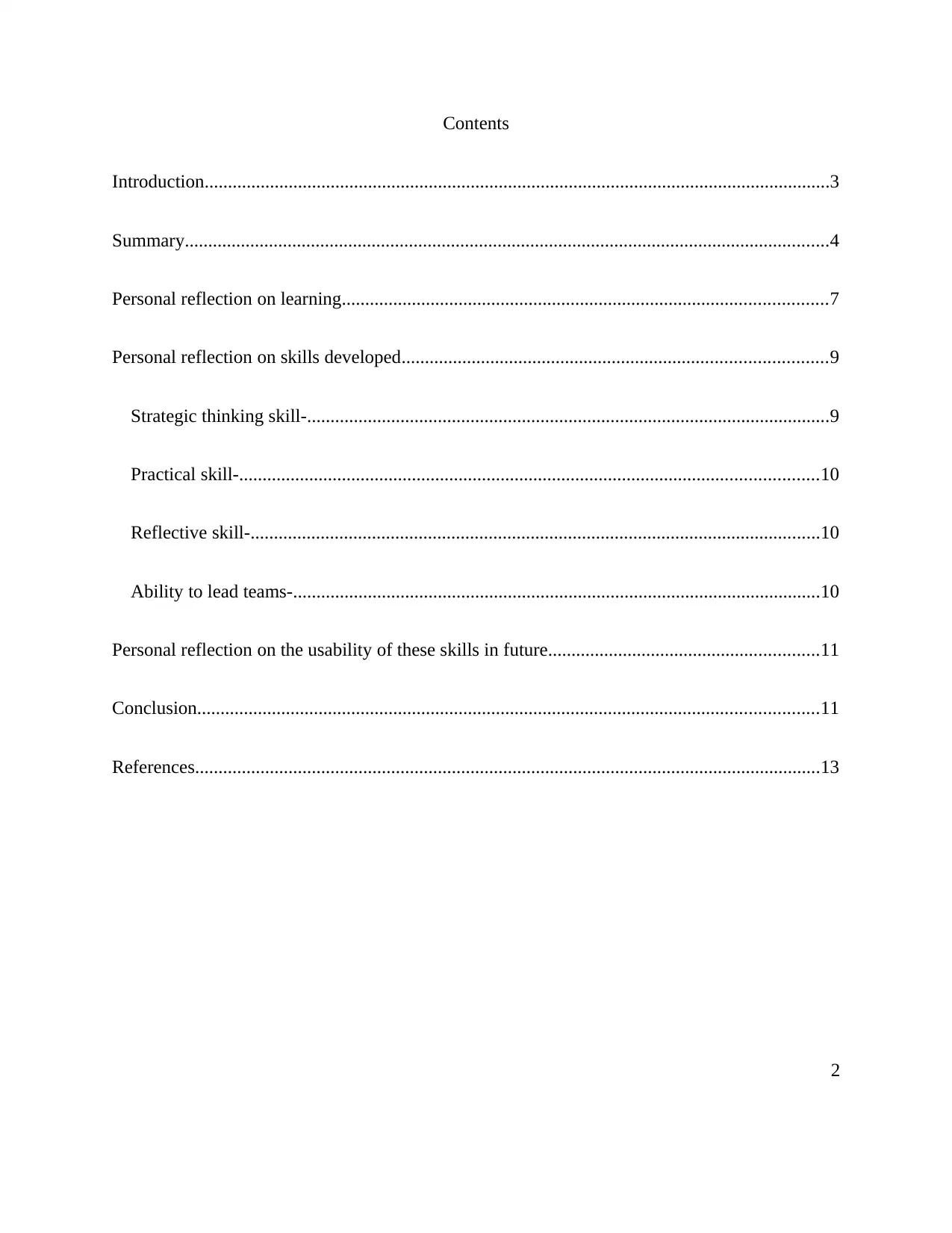
Contents
Introduction......................................................................................................................................3
Summary..........................................................................................................................................4
Personal reflection on learning........................................................................................................7
Personal reflection on skills developed...........................................................................................9
Strategic thinking skill-................................................................................................................9
Practical skill-............................................................................................................................10
Reflective skill-..........................................................................................................................10
Ability to lead teams-.................................................................................................................10
Personal reflection on the usability of these skills in future..........................................................11
Conclusion.....................................................................................................................................11
References......................................................................................................................................13
2
Introduction......................................................................................................................................3
Summary..........................................................................................................................................4
Personal reflection on learning........................................................................................................7
Personal reflection on skills developed...........................................................................................9
Strategic thinking skill-................................................................................................................9
Practical skill-............................................................................................................................10
Reflective skill-..........................................................................................................................10
Ability to lead teams-.................................................................................................................10
Personal reflection on the usability of these skills in future..........................................................11
Conclusion.....................................................................................................................................11
References......................................................................................................................................13
2
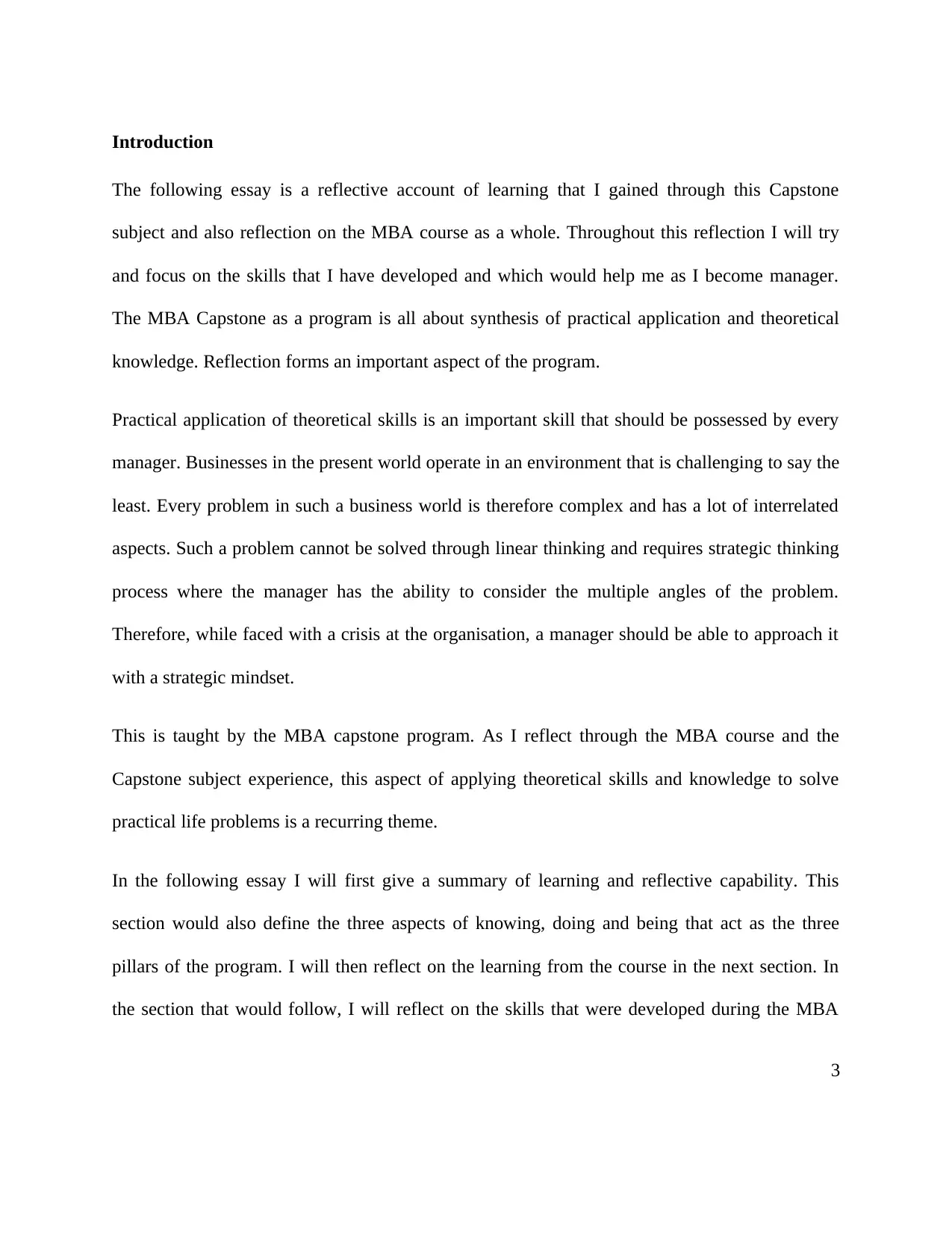
Introduction
The following essay is a reflective account of learning that I gained through this Capstone
subject and also reflection on the MBA course as a whole. Throughout this reflection I will try
and focus on the skills that I have developed and which would help me as I become manager.
The MBA Capstone as a program is all about synthesis of practical application and theoretical
knowledge. Reflection forms an important aspect of the program.
Practical application of theoretical skills is an important skill that should be possessed by every
manager. Businesses in the present world operate in an environment that is challenging to say the
least. Every problem in such a business world is therefore complex and has a lot of interrelated
aspects. Such a problem cannot be solved through linear thinking and requires strategic thinking
process where the manager has the ability to consider the multiple angles of the problem.
Therefore, while faced with a crisis at the organisation, a manager should be able to approach it
with a strategic mindset.
This is taught by the MBA capstone program. As I reflect through the MBA course and the
Capstone subject experience, this aspect of applying theoretical skills and knowledge to solve
practical life problems is a recurring theme.
In the following essay I will first give a summary of learning and reflective capability. This
section would also define the three aspects of knowing, doing and being that act as the three
pillars of the program. I will then reflect on the learning from the course in the next section. In
the section that would follow, I will reflect on the skills that were developed during the MBA
3
The following essay is a reflective account of learning that I gained through this Capstone
subject and also reflection on the MBA course as a whole. Throughout this reflection I will try
and focus on the skills that I have developed and which would help me as I become manager.
The MBA Capstone as a program is all about synthesis of practical application and theoretical
knowledge. Reflection forms an important aspect of the program.
Practical application of theoretical skills is an important skill that should be possessed by every
manager. Businesses in the present world operate in an environment that is challenging to say the
least. Every problem in such a business world is therefore complex and has a lot of interrelated
aspects. Such a problem cannot be solved through linear thinking and requires strategic thinking
process where the manager has the ability to consider the multiple angles of the problem.
Therefore, while faced with a crisis at the organisation, a manager should be able to approach it
with a strategic mindset.
This is taught by the MBA capstone program. As I reflect through the MBA course and the
Capstone subject experience, this aspect of applying theoretical skills and knowledge to solve
practical life problems is a recurring theme.
In the following essay I will first give a summary of learning and reflective capability. This
section would also define the three aspects of knowing, doing and being that act as the three
pillars of the program. I will then reflect on the learning from the course in the next section. In
the section that would follow, I will reflect on the skills that were developed during the MBA
3
⊘ This is a preview!⊘
Do you want full access?
Subscribe today to unlock all pages.

Trusted by 1+ million students worldwide
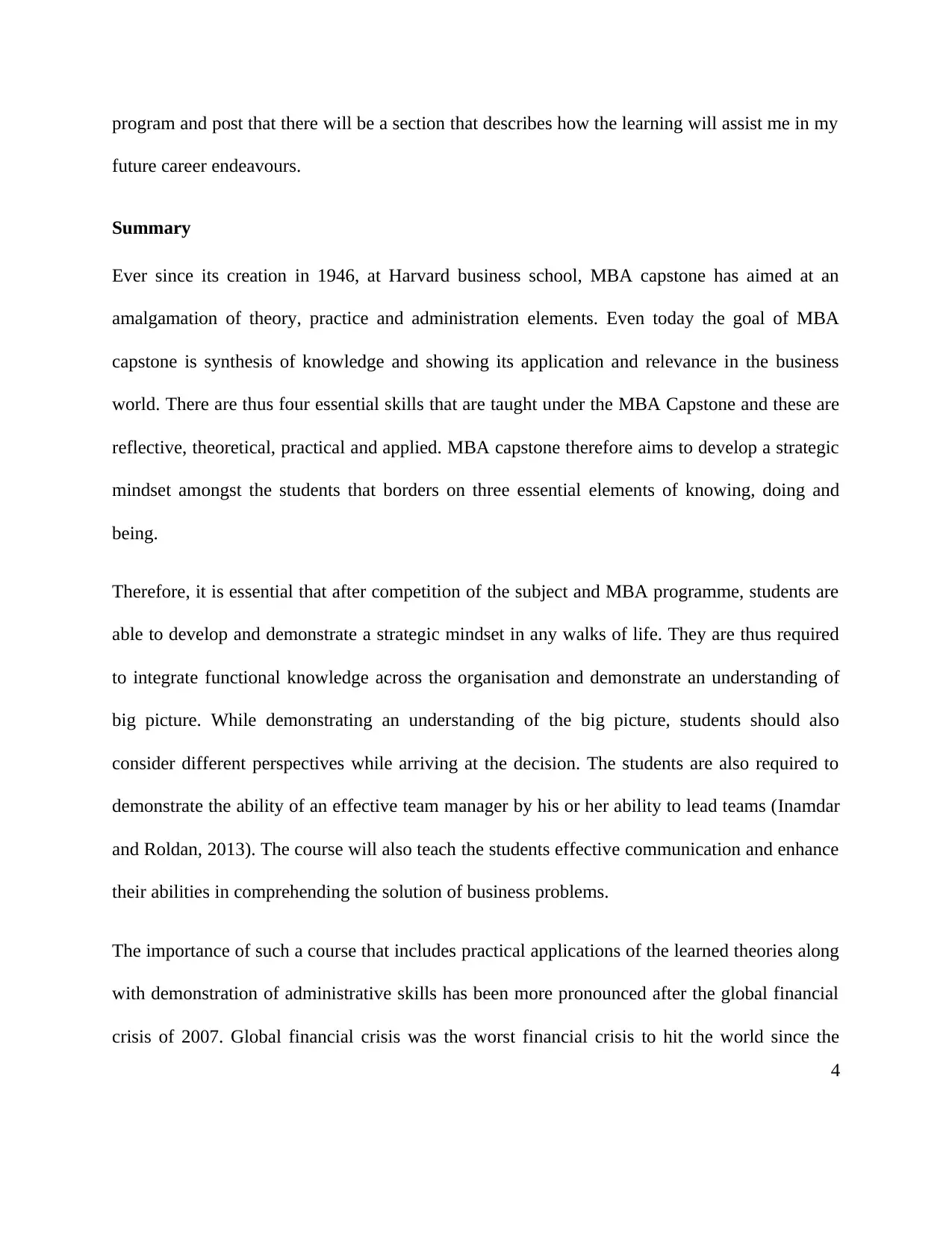
program and post that there will be a section that describes how the learning will assist me in my
future career endeavours.
Summary
Ever since its creation in 1946, at Harvard business school, MBA capstone has aimed at an
amalgamation of theory, practice and administration elements. Even today the goal of MBA
capstone is synthesis of knowledge and showing its application and relevance in the business
world. There are thus four essential skills that are taught under the MBA Capstone and these are
reflective, theoretical, practical and applied. MBA capstone therefore aims to develop a strategic
mindset amongst the students that borders on three essential elements of knowing, doing and
being.
Therefore, it is essential that after competition of the subject and MBA programme, students are
able to develop and demonstrate a strategic mindset in any walks of life. They are thus required
to integrate functional knowledge across the organisation and demonstrate an understanding of
big picture. While demonstrating an understanding of the big picture, students should also
consider different perspectives while arriving at the decision. The students are also required to
demonstrate the ability of an effective team manager by his or her ability to lead teams (Inamdar
and Roldan, 2013). The course will also teach the students effective communication and enhance
their abilities in comprehending the solution of business problems.
The importance of such a course that includes practical applications of the learned theories along
with demonstration of administrative skills has been more pronounced after the global financial
crisis of 2007. Global financial crisis was the worst financial crisis to hit the world since the
4
future career endeavours.
Summary
Ever since its creation in 1946, at Harvard business school, MBA capstone has aimed at an
amalgamation of theory, practice and administration elements. Even today the goal of MBA
capstone is synthesis of knowledge and showing its application and relevance in the business
world. There are thus four essential skills that are taught under the MBA Capstone and these are
reflective, theoretical, practical and applied. MBA capstone therefore aims to develop a strategic
mindset amongst the students that borders on three essential elements of knowing, doing and
being.
Therefore, it is essential that after competition of the subject and MBA programme, students are
able to develop and demonstrate a strategic mindset in any walks of life. They are thus required
to integrate functional knowledge across the organisation and demonstrate an understanding of
big picture. While demonstrating an understanding of the big picture, students should also
consider different perspectives while arriving at the decision. The students are also required to
demonstrate the ability of an effective team manager by his or her ability to lead teams (Inamdar
and Roldan, 2013). The course will also teach the students effective communication and enhance
their abilities in comprehending the solution of business problems.
The importance of such a course that includes practical applications of the learned theories along
with demonstration of administrative skills has been more pronounced after the global financial
crisis of 2007. Global financial crisis was the worst financial crisis to hit the world since the
4
Paraphrase This Document
Need a fresh take? Get an instant paraphrase of this document with our AI Paraphraser
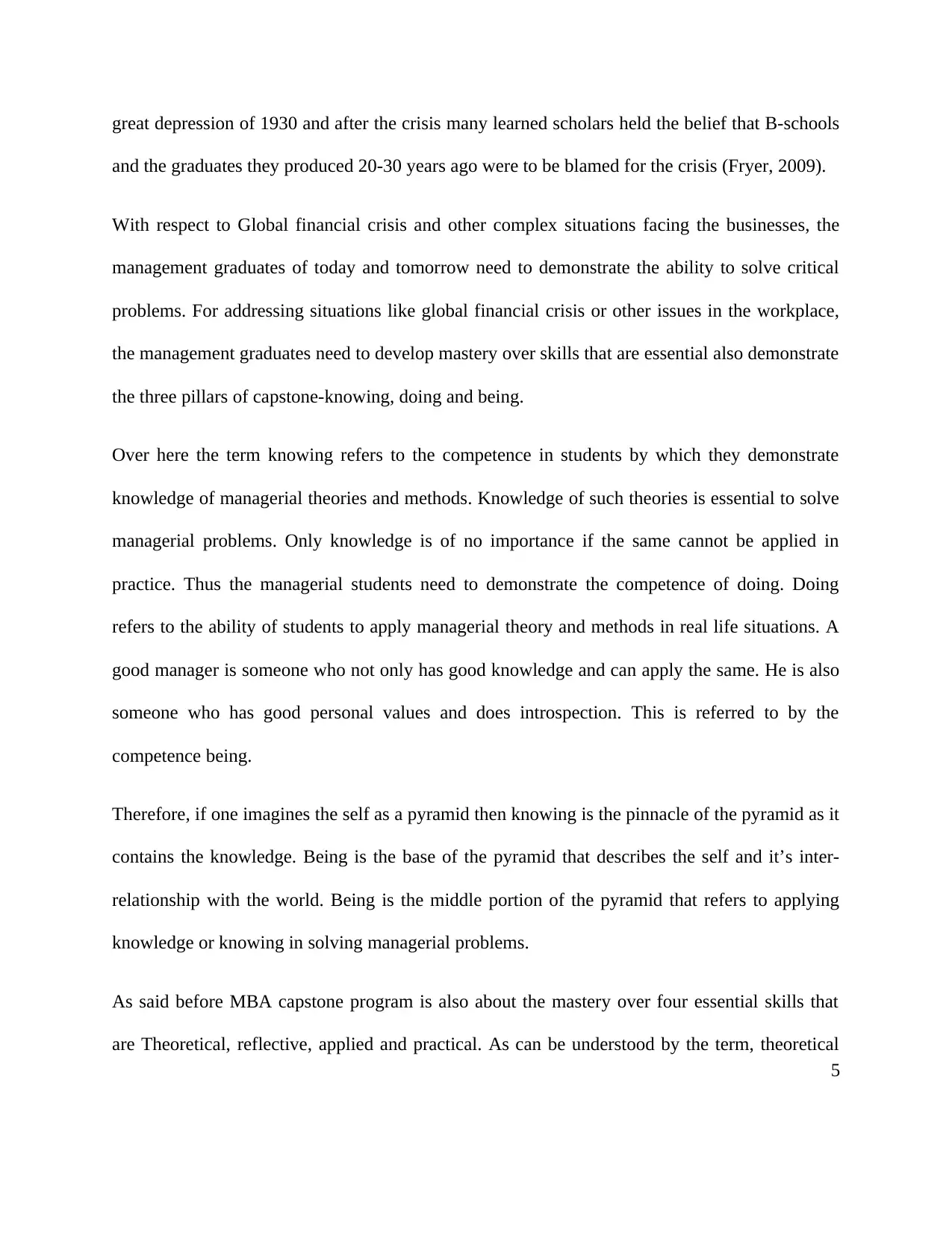
great depression of 1930 and after the crisis many learned scholars held the belief that B-schools
and the graduates they produced 20-30 years ago were to be blamed for the crisis (Fryer, 2009).
With respect to Global financial crisis and other complex situations facing the businesses, the
management graduates of today and tomorrow need to demonstrate the ability to solve critical
problems. For addressing situations like global financial crisis or other issues in the workplace,
the management graduates need to develop mastery over skills that are essential also demonstrate
the three pillars of capstone-knowing, doing and being.
Over here the term knowing refers to the competence in students by which they demonstrate
knowledge of managerial theories and methods. Knowledge of such theories is essential to solve
managerial problems. Only knowledge is of no importance if the same cannot be applied in
practice. Thus the managerial students need to demonstrate the competence of doing. Doing
refers to the ability of students to apply managerial theory and methods in real life situations. A
good manager is someone who not only has good knowledge and can apply the same. He is also
someone who has good personal values and does introspection. This is referred to by the
competence being.
Therefore, if one imagines the self as a pyramid then knowing is the pinnacle of the pyramid as it
contains the knowledge. Being is the base of the pyramid that describes the self and it’s inter-
relationship with the world. Being is the middle portion of the pyramid that refers to applying
knowledge or knowing in solving managerial problems.
As said before MBA capstone program is also about the mastery over four essential skills that
are Theoretical, reflective, applied and practical. As can be understood by the term, theoretical
5
and the graduates they produced 20-30 years ago were to be blamed for the crisis (Fryer, 2009).
With respect to Global financial crisis and other complex situations facing the businesses, the
management graduates of today and tomorrow need to demonstrate the ability to solve critical
problems. For addressing situations like global financial crisis or other issues in the workplace,
the management graduates need to develop mastery over skills that are essential also demonstrate
the three pillars of capstone-knowing, doing and being.
Over here the term knowing refers to the competence in students by which they demonstrate
knowledge of managerial theories and methods. Knowledge of such theories is essential to solve
managerial problems. Only knowledge is of no importance if the same cannot be applied in
practice. Thus the managerial students need to demonstrate the competence of doing. Doing
refers to the ability of students to apply managerial theory and methods in real life situations. A
good manager is someone who not only has good knowledge and can apply the same. He is also
someone who has good personal values and does introspection. This is referred to by the
competence being.
Therefore, if one imagines the self as a pyramid then knowing is the pinnacle of the pyramid as it
contains the knowledge. Being is the base of the pyramid that describes the self and it’s inter-
relationship with the world. Being is the middle portion of the pyramid that refers to applying
knowledge or knowing in solving managerial problems.
As said before MBA capstone program is also about the mastery over four essential skills that
are Theoretical, reflective, applied and practical. As can be understood by the term, theoretical
5
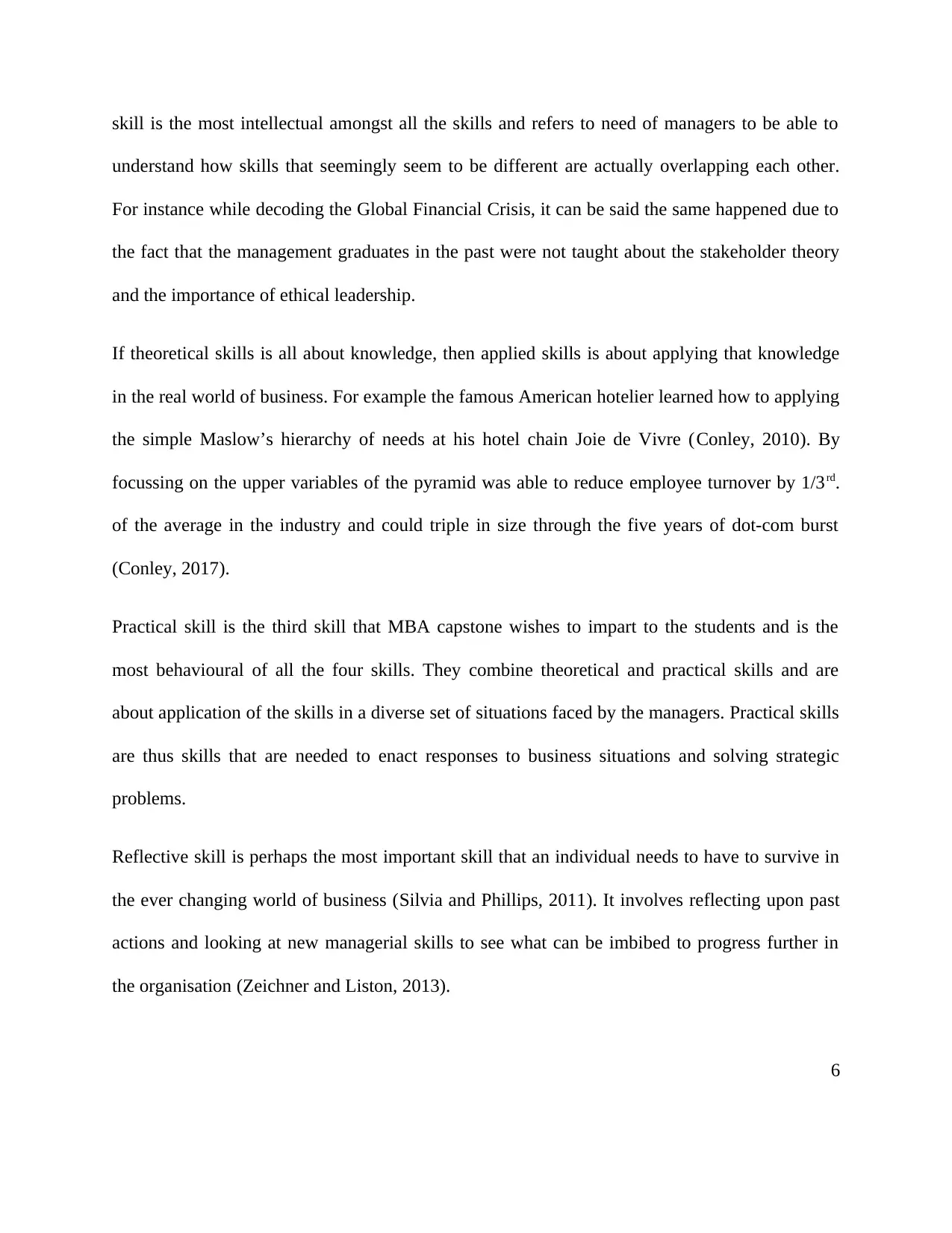
skill is the most intellectual amongst all the skills and refers to need of managers to be able to
understand how skills that seemingly seem to be different are actually overlapping each other.
For instance while decoding the Global Financial Crisis, it can be said the same happened due to
the fact that the management graduates in the past were not taught about the stakeholder theory
and the importance of ethical leadership.
If theoretical skills is all about knowledge, then applied skills is about applying that knowledge
in the real world of business. For example the famous American hotelier learned how to applying
the simple Maslow’s hierarchy of needs at his hotel chain Joie de Vivre (Conley, 2010). By
focussing on the upper variables of the pyramid was able to reduce employee turnover by 1/3rd.
of the average in the industry and could triple in size through the five years of dot-com burst
(Conley, 2017).
Practical skill is the third skill that MBA capstone wishes to impart to the students and is the
most behavioural of all the four skills. They combine theoretical and practical skills and are
about application of the skills in a diverse set of situations faced by the managers. Practical skills
are thus skills that are needed to enact responses to business situations and solving strategic
problems.
Reflective skill is perhaps the most important skill that an individual needs to have to survive in
the ever changing world of business (Silvia and Phillips, 2011). It involves reflecting upon past
actions and looking at new managerial skills to see what can be imbibed to progress further in
the organisation (Zeichner and Liston, 2013).
6
understand how skills that seemingly seem to be different are actually overlapping each other.
For instance while decoding the Global Financial Crisis, it can be said the same happened due to
the fact that the management graduates in the past were not taught about the stakeholder theory
and the importance of ethical leadership.
If theoretical skills is all about knowledge, then applied skills is about applying that knowledge
in the real world of business. For example the famous American hotelier learned how to applying
the simple Maslow’s hierarchy of needs at his hotel chain Joie de Vivre (Conley, 2010). By
focussing on the upper variables of the pyramid was able to reduce employee turnover by 1/3rd.
of the average in the industry and could triple in size through the five years of dot-com burst
(Conley, 2017).
Practical skill is the third skill that MBA capstone wishes to impart to the students and is the
most behavioural of all the four skills. They combine theoretical and practical skills and are
about application of the skills in a diverse set of situations faced by the managers. Practical skills
are thus skills that are needed to enact responses to business situations and solving strategic
problems.
Reflective skill is perhaps the most important skill that an individual needs to have to survive in
the ever changing world of business (Silvia and Phillips, 2011). It involves reflecting upon past
actions and looking at new managerial skills to see what can be imbibed to progress further in
the organisation (Zeichner and Liston, 2013).
6
⊘ This is a preview!⊘
Do you want full access?
Subscribe today to unlock all pages.

Trusted by 1+ million students worldwide
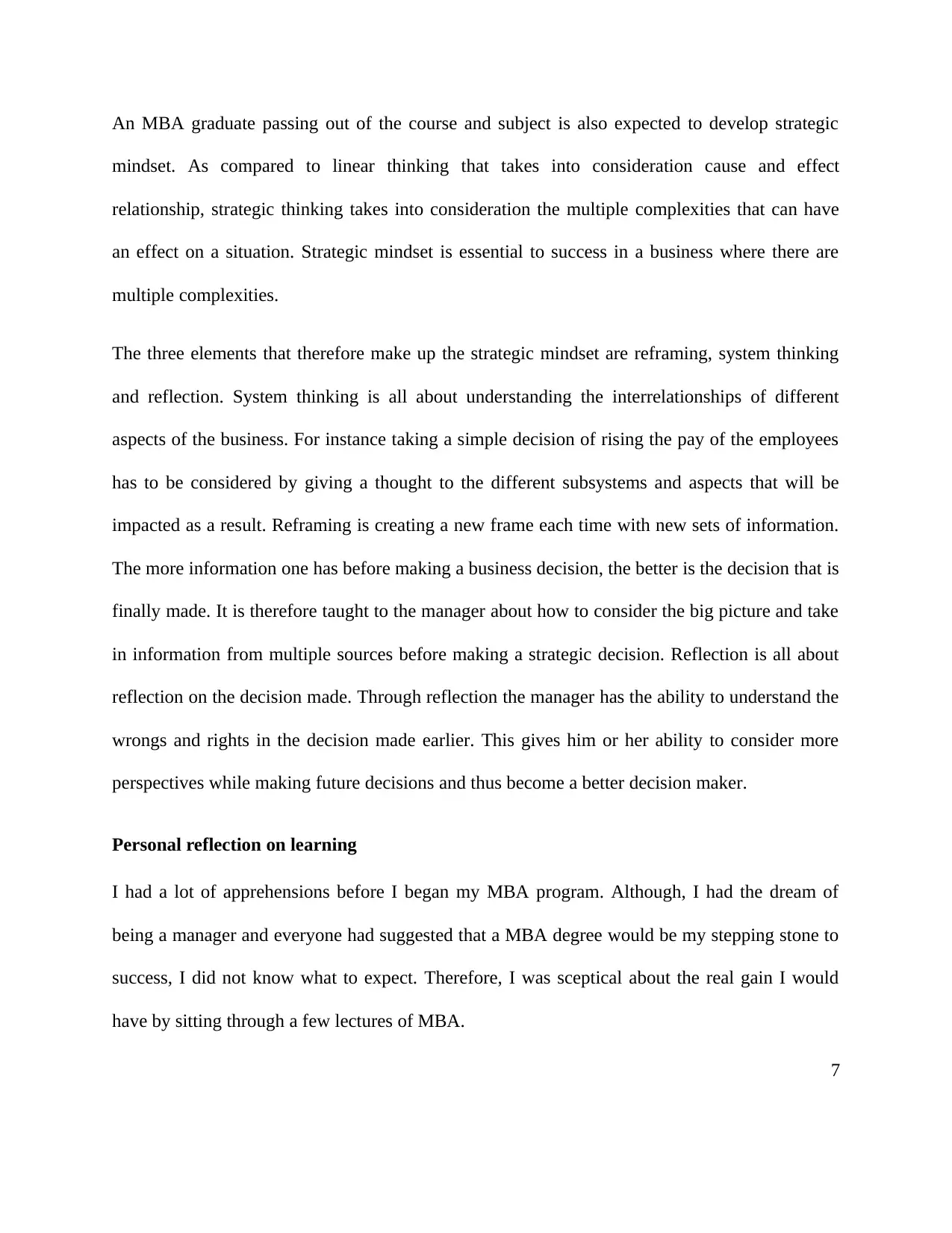
An MBA graduate passing out of the course and subject is also expected to develop strategic
mindset. As compared to linear thinking that takes into consideration cause and effect
relationship, strategic thinking takes into consideration the multiple complexities that can have
an effect on a situation. Strategic mindset is essential to success in a business where there are
multiple complexities.
The three elements that therefore make up the strategic mindset are reframing, system thinking
and reflection. System thinking is all about understanding the interrelationships of different
aspects of the business. For instance taking a simple decision of rising the pay of the employees
has to be considered by giving a thought to the different subsystems and aspects that will be
impacted as a result. Reframing is creating a new frame each time with new sets of information.
The more information one has before making a business decision, the better is the decision that is
finally made. It is therefore taught to the manager about how to consider the big picture and take
in information from multiple sources before making a strategic decision. Reflection is all about
reflection on the decision made. Through reflection the manager has the ability to understand the
wrongs and rights in the decision made earlier. This gives him or her ability to consider more
perspectives while making future decisions and thus become a better decision maker.
Personal reflection on learning
I had a lot of apprehensions before I began my MBA program. Although, I had the dream of
being a manager and everyone had suggested that a MBA degree would be my stepping stone to
success, I did not know what to expect. Therefore, I was sceptical about the real gain I would
have by sitting through a few lectures of MBA.
7
mindset. As compared to linear thinking that takes into consideration cause and effect
relationship, strategic thinking takes into consideration the multiple complexities that can have
an effect on a situation. Strategic mindset is essential to success in a business where there are
multiple complexities.
The three elements that therefore make up the strategic mindset are reframing, system thinking
and reflection. System thinking is all about understanding the interrelationships of different
aspects of the business. For instance taking a simple decision of rising the pay of the employees
has to be considered by giving a thought to the different subsystems and aspects that will be
impacted as a result. Reframing is creating a new frame each time with new sets of information.
The more information one has before making a business decision, the better is the decision that is
finally made. It is therefore taught to the manager about how to consider the big picture and take
in information from multiple sources before making a strategic decision. Reflection is all about
reflection on the decision made. Through reflection the manager has the ability to understand the
wrongs and rights in the decision made earlier. This gives him or her ability to consider more
perspectives while making future decisions and thus become a better decision maker.
Personal reflection on learning
I had a lot of apprehensions before I began my MBA program. Although, I had the dream of
being a manager and everyone had suggested that a MBA degree would be my stepping stone to
success, I did not know what to expect. Therefore, I was sceptical about the real gain I would
have by sitting through a few lectures of MBA.
7
Paraphrase This Document
Need a fresh take? Get an instant paraphrase of this document with our AI Paraphraser
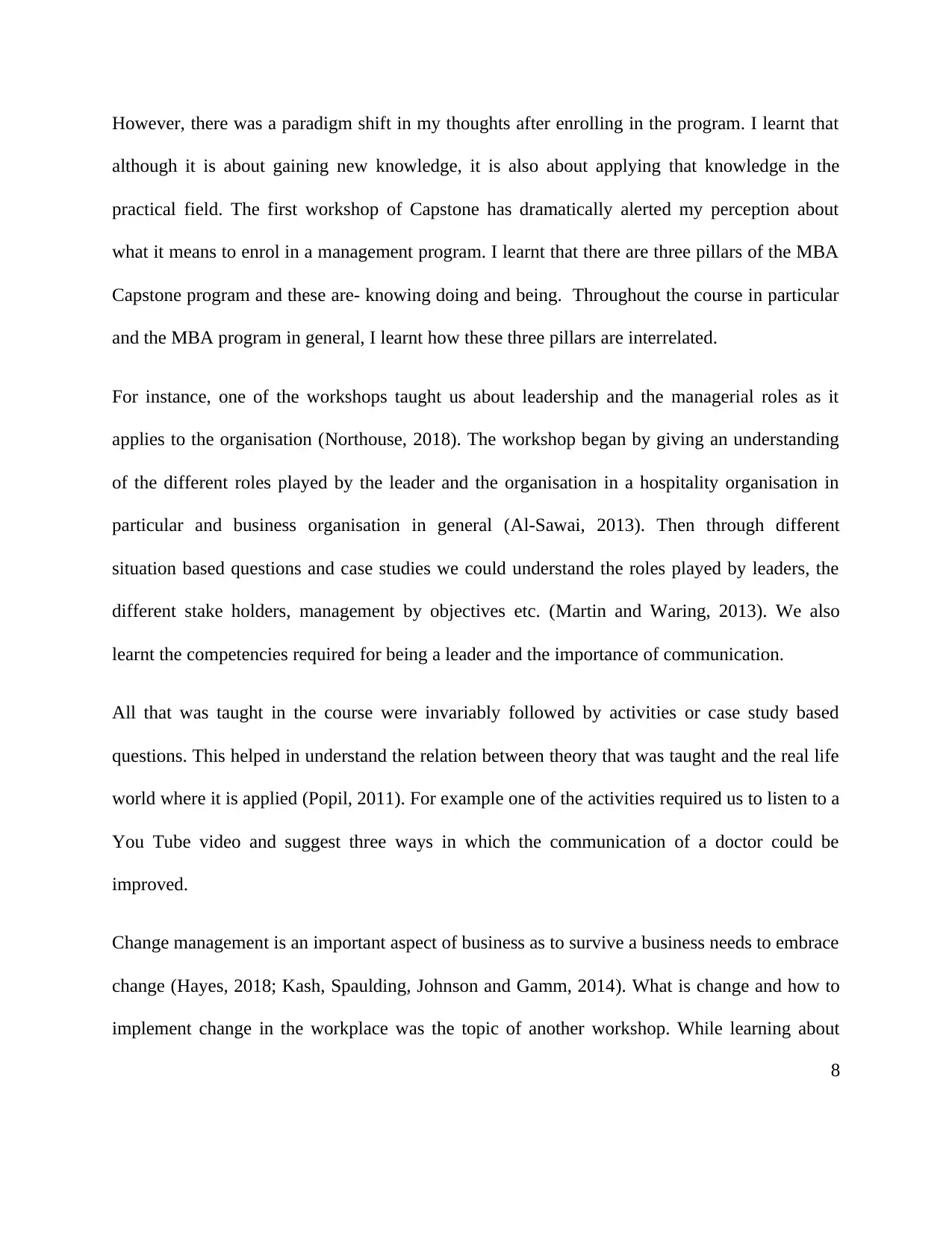
However, there was a paradigm shift in my thoughts after enrolling in the program. I learnt that
although it is about gaining new knowledge, it is also about applying that knowledge in the
practical field. The first workshop of Capstone has dramatically alerted my perception about
what it means to enrol in a management program. I learnt that there are three pillars of the MBA
Capstone program and these are- knowing doing and being. Throughout the course in particular
and the MBA program in general, I learnt how these three pillars are interrelated.
For instance, one of the workshops taught us about leadership and the managerial roles as it
applies to the organisation (Northouse, 2018). The workshop began by giving an understanding
of the different roles played by the leader and the organisation in a hospitality organisation in
particular and business organisation in general (Al-Sawai, 2013). Then through different
situation based questions and case studies we could understand the roles played by leaders, the
different stake holders, management by objectives etc. (Martin and Waring, 2013). We also
learnt the competencies required for being a leader and the importance of communication.
All that was taught in the course were invariably followed by activities or case study based
questions. This helped in understand the relation between theory that was taught and the real life
world where it is applied (Popil, 2011). For example one of the activities required us to listen to a
You Tube video and suggest three ways in which the communication of a doctor could be
improved.
Change management is an important aspect of business as to survive a business needs to embrace
change (Hayes, 2018; Kash, Spaulding, Johnson and Gamm, 2014). What is change and how to
implement change in the workplace was the topic of another workshop. While learning about
8
although it is about gaining new knowledge, it is also about applying that knowledge in the
practical field. The first workshop of Capstone has dramatically alerted my perception about
what it means to enrol in a management program. I learnt that there are three pillars of the MBA
Capstone program and these are- knowing doing and being. Throughout the course in particular
and the MBA program in general, I learnt how these three pillars are interrelated.
For instance, one of the workshops taught us about leadership and the managerial roles as it
applies to the organisation (Northouse, 2018). The workshop began by giving an understanding
of the different roles played by the leader and the organisation in a hospitality organisation in
particular and business organisation in general (Al-Sawai, 2013). Then through different
situation based questions and case studies we could understand the roles played by leaders, the
different stake holders, management by objectives etc. (Martin and Waring, 2013). We also
learnt the competencies required for being a leader and the importance of communication.
All that was taught in the course were invariably followed by activities or case study based
questions. This helped in understand the relation between theory that was taught and the real life
world where it is applied (Popil, 2011). For example one of the activities required us to listen to a
You Tube video and suggest three ways in which the communication of a doctor could be
improved.
Change management is an important aspect of business as to survive a business needs to embrace
change (Hayes, 2018; Kash, Spaulding, Johnson and Gamm, 2014). What is change and how to
implement change in the workplace was the topic of another workshop. While learning about
8
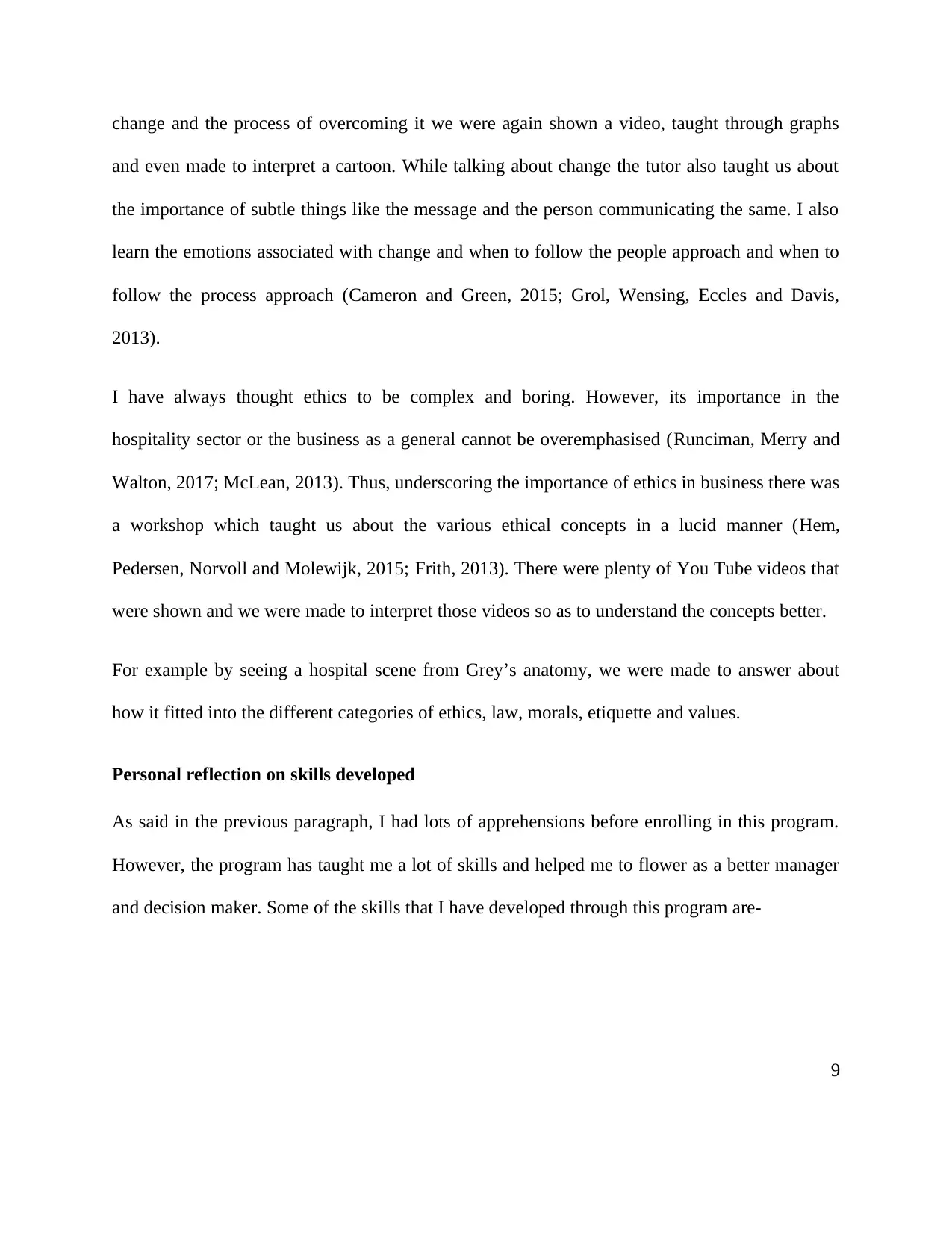
change and the process of overcoming it we were again shown a video, taught through graphs
and even made to interpret a cartoon. While talking about change the tutor also taught us about
the importance of subtle things like the message and the person communicating the same. I also
learn the emotions associated with change and when to follow the people approach and when to
follow the process approach (Cameron and Green, 2015; Grol, Wensing, Eccles and Davis,
2013).
I have always thought ethics to be complex and boring. However, its importance in the
hospitality sector or the business as a general cannot be overemphasised (Runciman, Merry and
Walton, 2017; McLean, 2013). Thus, underscoring the importance of ethics in business there was
a workshop which taught us about the various ethical concepts in a lucid manner (Hem,
Pedersen, Norvoll and Molewijk, 2015; Frith, 2013). There were plenty of You Tube videos that
were shown and we were made to interpret those videos so as to understand the concepts better.
For example by seeing a hospital scene from Grey’s anatomy, we were made to answer about
how it fitted into the different categories of ethics, law, morals, etiquette and values.
Personal reflection on skills developed
As said in the previous paragraph, I had lots of apprehensions before enrolling in this program.
However, the program has taught me a lot of skills and helped me to flower as a better manager
and decision maker. Some of the skills that I have developed through this program are-
9
and even made to interpret a cartoon. While talking about change the tutor also taught us about
the importance of subtle things like the message and the person communicating the same. I also
learn the emotions associated with change and when to follow the people approach and when to
follow the process approach (Cameron and Green, 2015; Grol, Wensing, Eccles and Davis,
2013).
I have always thought ethics to be complex and boring. However, its importance in the
hospitality sector or the business as a general cannot be overemphasised (Runciman, Merry and
Walton, 2017; McLean, 2013). Thus, underscoring the importance of ethics in business there was
a workshop which taught us about the various ethical concepts in a lucid manner (Hem,
Pedersen, Norvoll and Molewijk, 2015; Frith, 2013). There were plenty of You Tube videos that
were shown and we were made to interpret those videos so as to understand the concepts better.
For example by seeing a hospital scene from Grey’s anatomy, we were made to answer about
how it fitted into the different categories of ethics, law, morals, etiquette and values.
Personal reflection on skills developed
As said in the previous paragraph, I had lots of apprehensions before enrolling in this program.
However, the program has taught me a lot of skills and helped me to flower as a better manager
and decision maker. Some of the skills that I have developed through this program are-
9
⊘ This is a preview!⊘
Do you want full access?
Subscribe today to unlock all pages.

Trusted by 1+ million students worldwide
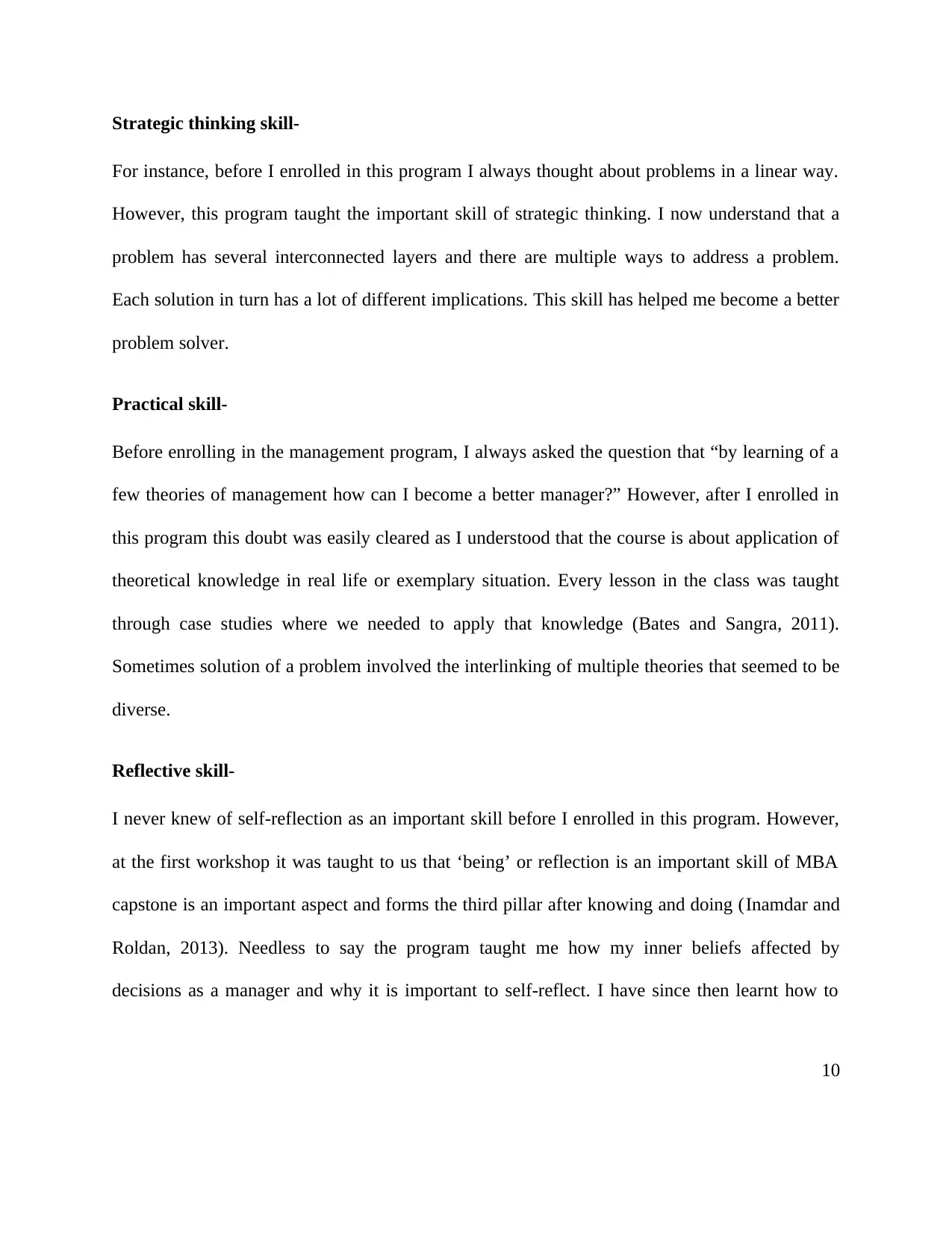
Strategic thinking skill-
For instance, before I enrolled in this program I always thought about problems in a linear way.
However, this program taught the important skill of strategic thinking. I now understand that a
problem has several interconnected layers and there are multiple ways to address a problem.
Each solution in turn has a lot of different implications. This skill has helped me become a better
problem solver.
Practical skill-
Before enrolling in the management program, I always asked the question that “by learning of a
few theories of management how can I become a better manager?” However, after I enrolled in
this program this doubt was easily cleared as I understood that the course is about application of
theoretical knowledge in real life or exemplary situation. Every lesson in the class was taught
through case studies where we needed to apply that knowledge (Bates and Sangra, 2011).
Sometimes solution of a problem involved the interlinking of multiple theories that seemed to be
diverse.
Reflective skill-
I never knew of self-reflection as an important skill before I enrolled in this program. However,
at the first workshop it was taught to us that ‘being’ or reflection is an important skill of MBA
capstone is an important aspect and forms the third pillar after knowing and doing (Inamdar and
Roldan, 2013). Needless to say the program taught me how my inner beliefs affected by
decisions as a manager and why it is important to self-reflect. I have since then learnt how to
10
For instance, before I enrolled in this program I always thought about problems in a linear way.
However, this program taught the important skill of strategic thinking. I now understand that a
problem has several interconnected layers and there are multiple ways to address a problem.
Each solution in turn has a lot of different implications. This skill has helped me become a better
problem solver.
Practical skill-
Before enrolling in the management program, I always asked the question that “by learning of a
few theories of management how can I become a better manager?” However, after I enrolled in
this program this doubt was easily cleared as I understood that the course is about application of
theoretical knowledge in real life or exemplary situation. Every lesson in the class was taught
through case studies where we needed to apply that knowledge (Bates and Sangra, 2011).
Sometimes solution of a problem involved the interlinking of multiple theories that seemed to be
diverse.
Reflective skill-
I never knew of self-reflection as an important skill before I enrolled in this program. However,
at the first workshop it was taught to us that ‘being’ or reflection is an important skill of MBA
capstone is an important aspect and forms the third pillar after knowing and doing (Inamdar and
Roldan, 2013). Needless to say the program taught me how my inner beliefs affected by
decisions as a manager and why it is important to self-reflect. I have since then learnt how to
10
Paraphrase This Document
Need a fresh take? Get an instant paraphrase of this document with our AI Paraphraser
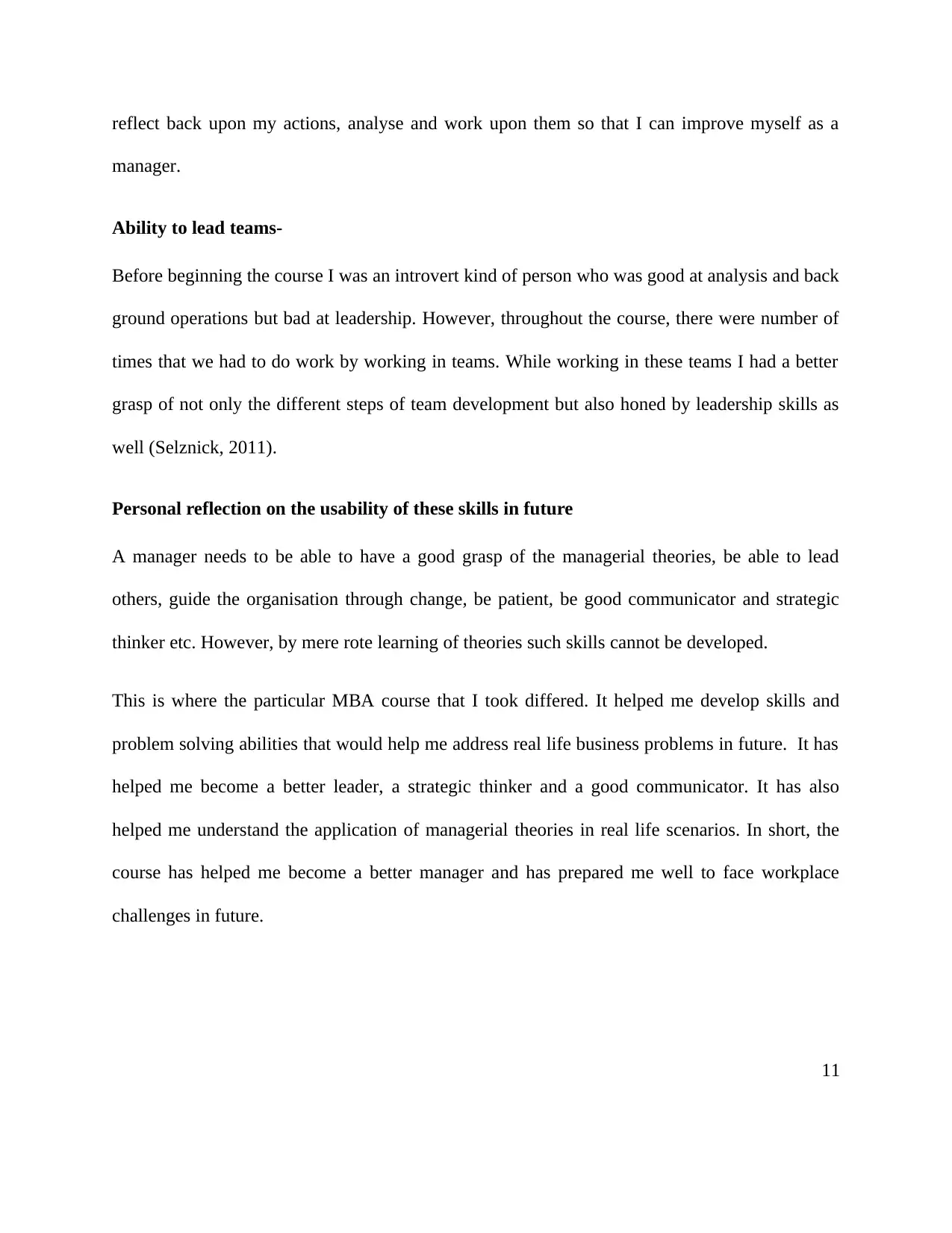
reflect back upon my actions, analyse and work upon them so that I can improve myself as a
manager.
Ability to lead teams-
Before beginning the course I was an introvert kind of person who was good at analysis and back
ground operations but bad at leadership. However, throughout the course, there were number of
times that we had to do work by working in teams. While working in these teams I had a better
grasp of not only the different steps of team development but also honed by leadership skills as
well (Selznick, 2011).
Personal reflection on the usability of these skills in future
A manager needs to be able to have a good grasp of the managerial theories, be able to lead
others, guide the organisation through change, be patient, be good communicator and strategic
thinker etc. However, by mere rote learning of theories such skills cannot be developed.
This is where the particular MBA course that I took differed. It helped me develop skills and
problem solving abilities that would help me address real life business problems in future. It has
helped me become a better leader, a strategic thinker and a good communicator. It has also
helped me understand the application of managerial theories in real life scenarios. In short, the
course has helped me become a better manager and has prepared me well to face workplace
challenges in future.
11
manager.
Ability to lead teams-
Before beginning the course I was an introvert kind of person who was good at analysis and back
ground operations but bad at leadership. However, throughout the course, there were number of
times that we had to do work by working in teams. While working in these teams I had a better
grasp of not only the different steps of team development but also honed by leadership skills as
well (Selznick, 2011).
Personal reflection on the usability of these skills in future
A manager needs to be able to have a good grasp of the managerial theories, be able to lead
others, guide the organisation through change, be patient, be good communicator and strategic
thinker etc. However, by mere rote learning of theories such skills cannot be developed.
This is where the particular MBA course that I took differed. It helped me develop skills and
problem solving abilities that would help me address real life business problems in future. It has
helped me become a better leader, a strategic thinker and a good communicator. It has also
helped me understand the application of managerial theories in real life scenarios. In short, the
course has helped me become a better manager and has prepared me well to face workplace
challenges in future.
11
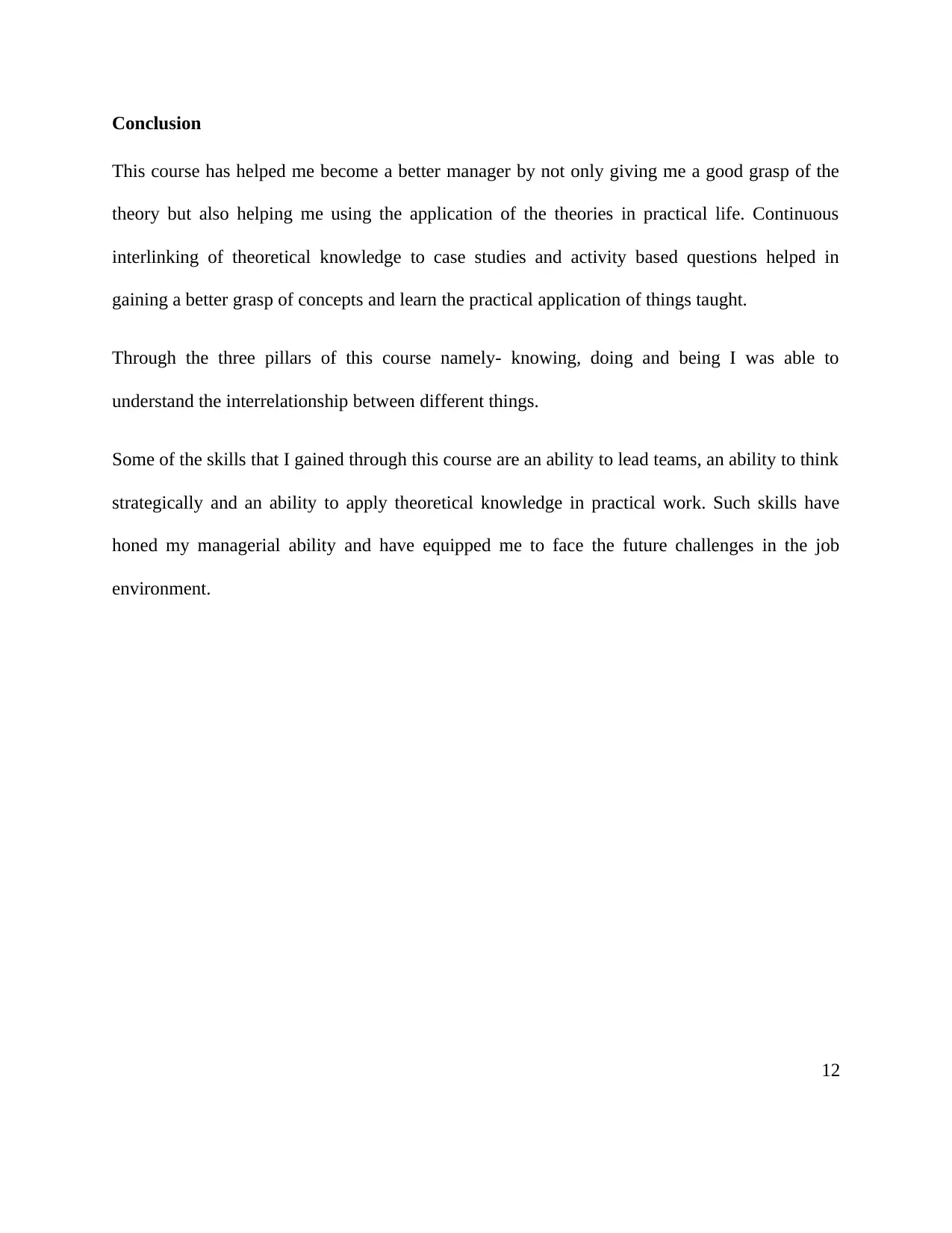
Conclusion
This course has helped me become a better manager by not only giving me a good grasp of the
theory but also helping me using the application of the theories in practical life. Continuous
interlinking of theoretical knowledge to case studies and activity based questions helped in
gaining a better grasp of concepts and learn the practical application of things taught.
Through the three pillars of this course namely- knowing, doing and being I was able to
understand the interrelationship between different things.
Some of the skills that I gained through this course are an ability to lead teams, an ability to think
strategically and an ability to apply theoretical knowledge in practical work. Such skills have
honed my managerial ability and have equipped me to face the future challenges in the job
environment.
12
This course has helped me become a better manager by not only giving me a good grasp of the
theory but also helping me using the application of the theories in practical life. Continuous
interlinking of theoretical knowledge to case studies and activity based questions helped in
gaining a better grasp of concepts and learn the practical application of things taught.
Through the three pillars of this course namely- knowing, doing and being I was able to
understand the interrelationship between different things.
Some of the skills that I gained through this course are an ability to lead teams, an ability to think
strategically and an ability to apply theoretical knowledge in practical work. Such skills have
honed my managerial ability and have equipped me to face the future challenges in the job
environment.
12
⊘ This is a preview!⊘
Do you want full access?
Subscribe today to unlock all pages.

Trusted by 1+ million students worldwide
1 out of 15
Related Documents
Your All-in-One AI-Powered Toolkit for Academic Success.
+13062052269
info@desklib.com
Available 24*7 on WhatsApp / Email
![[object Object]](/_next/static/media/star-bottom.7253800d.svg)
Unlock your academic potential
Copyright © 2020–2026 A2Z Services. All Rights Reserved. Developed and managed by ZUCOL.



